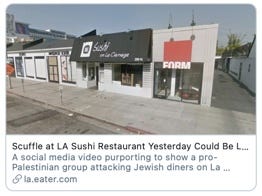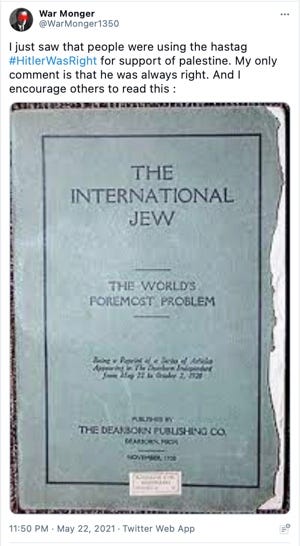What Would You Do If You Weren't Afraid?
Would you speak up when people are unfairly maligned?
Michal Oshman is the head of company culture, diversity and inclusion at TikTok Europe. An Israeli who lives in the UK, she’s a leadership expert who was in charge of team development at Facebook. Her new book is titled What Would You Do if You Weren’t Afraid?
With the global surge of violence against Jews coinciding with a sharp uptick in online antisemitism –– and an environment in which people are afraid to voice unpopular opinions –– it’s a good time to ask ourselves what we would do if we were not afraid.
Would we speak up for those being unfairly maligned?
This is the dilemma facing many today in various arenas, whether it’s academia, journalism, the workplace, or politics. Especially fraught right now, given the recent conflict between Israel and Hamas, is openly supporting Israel’s right to exist as a Jewish State.
In ways reminiscent of the antisemitic propaganda of the 1930s, which convinced significant numbers of people that Jews rather than Nazis were secretly plotting global domination, now Hamas seems to be convincing people that Israel, not Hamas, is a terrorist organization that intentionally kills civilians and targets children. No amount of evidence seems to make a difference. And attacks on Jews are proliferating across the globe, even in California and New York, together home to between 30% and 40% of America’s Jews.
Recently in Manhattan’s diamond district, where many Jews work, anti-Israel demonstrators, shouting “F-ing Zionists,” threw fireworks at passersby, and in West Hollywood, CA, anti-Israel demonstrators asked outside diners if they were Jewish, then physically attacked those who said they were. (Though investigated as an antisemitic hate crime, the incident was reported in one place as a “scuffle.”)
In the 20th century, the fabricated text, The Protocols of the Elders of Zion, was understood to be horrific, hateful, antisemitic lies. Twenty years ago, “Kill the Jews” (Yahud) would have been unambiguously seen as antisemitic. Today, however, as long as “Yahud” is translated into English as “Zionists,” blatant antisemitism is sanitized and defended as political criticism. (Given its title, one wonders how long it will be before The Protocols of the Elders of Zion is described this way, too.)
As a result, despite the association between online antisemitism and offline antisemitic rhetoric and violence against Jews, hateful hashtags like #Covid1948 (likening the birth of Israel to a deadly virus) and even #HitlerWasRight are still circulating on Twitter. (See my recent article in the Jewish Journal co-authored by Alex Goldenberg of the Network Contagion Research Institute.)
Meanwhile, Twitter, in its limitless lack of wisdom, has decided that antisemitism of this kind is to be characterized by the platform as “political speech.” The Telegraph in the UK appears to be the only media organization currently covering Twitter’s handling of what my colleagues at the NCRI note is “a contagion of antisemitic hate” that appears to be “emerging [on Twitter] at an unprecedented scale.” I am no fan of censorship, but for a platform that permanently suspends users for being insensitive to trans people by saying “men aren’t women,” the double standard is undeniable.
UPCOMING EVENTS:
THIS WEEK
ON ZOOM:
During my first paid-subscriber Zoom event on Monday, May 24 at 1:00pm Eastern, I’ll ask Nadine Strossen, legal scholar, former ACLU president, and author of HATE: Why We Should Resist it With Free Speech, Not Censorship about internet censorship and free speech. Depending on the number of attendees, we’ll either do a freewheeling conversation or a structured Q&A. (Details are being sent to paid subscribers.)
Also, on Monday, May 24 at 2:00pm Eastern, immediately after the Zoom call with Nadine Strossen, I’ll be helping to moderate an online event offered by the Jewish Institute for Liberal Values (JILV): Jewish Voices from the Former Soviet Union. (You can register here.)
ON CLUBHOUSE:
On Wednesday, May 26 at 6pm Eastern, join me for a conversation and Q&A with Title IX and Free Speech legal expert Samantha Harris.
Then at 8pm Eastern, also on Wednesday May 26, join me for a conversation and Q&A about Fear and Censorship in U.S. Universities with theoretical physicist, Lawrence Krauss. (You can read his most recent op-ed in the WSJ here and an earlier one here.)
NEXT WEEK
On Monday, May 31 at 12:00pm Eastern, paid subscribers are invited to join me for a conversation and Q&A with award-winning translator & University of Chicago Classics professor Shadi Bartsch, who will talk about her new translation of The Aeneid, and what the classics can teach us about ourselves in our hyper-polarized and impersonally connected internet age.
On Tuesday, June 1 at 11am Eastern, my colleague Joel Finkelstein from the NCRI and I will be participating in a conversation about antisemitism hosted by The Institute for the Study of Global Antisemitism and Policy. (Details to follow.)
Still to be scheduled:
Bret Stephens on The Dying Art of Disagreement
Alan Dershowitz on the Fourth Amendment: The right of the people to be secure in their persons, houses, papers, and effects, against unreasonable searches and seizures, shall not be violated, and no warrants shall issue, but upon probable cause, supported by oath or affirmation, and particularly describing the place to be searched, and the persons or things to be seized.
More to come…




